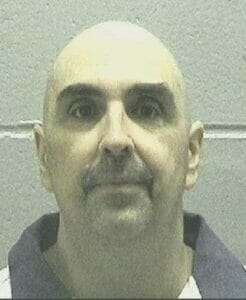
William Sallie was executed by the State of Georgia for the murder of his father in law. According to court documents William Sallie would shoot to death his father in law John Moore and would also shoot his mother in law Linda Moore. William Sallie would then take his wife and her sister back to his home however would eventually release the two. William Sallie and his ex wife were involved in a custody battle over their child. William Sallie would be executed by lethal injection on December 6, 2016
William Sallie More News
Georgia executed its ninth inmate this year on Tuesday night, putting to death a man convicted of killing his father-in-law more than a quarter century ago.
William Sallie, 50, was pronounced dead at 10:05 p.m. after a lethal injection at the state prison in Jackson.
Lawyers who sought to block William Sallie’s execution said he should be granted a new trial because of alleged juror bias, but courts haven’t properly considered that evidence because he missed a filing deadline by eight days at a time when he didn’t have a lawyer, his lawyers said in court filings.
Georgia has put to death more people this year than any other state, including Texas with seven. There have been 68 men and one woman executed in Georgia since 1976, CBS affiliate WGCL reports.
Sallie was the 46th inmate put to death by lethal injection, according to officials.
Sallie was convicted of murder in the fatal shooting of John Lee Moore in March 1990. His first conviction and death sentence were overturned because his attorney had a conflict of interest.
At his second trial in 2001, a woman eventually chosen as a juror lied during jury selection and failed to disclose domestic violence, messy divorces and a child custody battle that were “bizarrely similar” to Sallie’s case, his lawyers said. They add she later bragged to his attorneys’ investigator that she persuaded her divided peers to vote unanimously for death.
The defense team made those arguments in a clemency petition to the Georgia Board of Pardons and Paroles, urging it to act as a “fail safe” against a miscarriage of justice. But the board, the only authority in Georgia with power to commute a death sentence, declined to spare Sallie’s life following a clemency hearing Monday.
Sallie’s lawyers asked the U.S. Supreme Court to stop the scheduled execution, but it declined. They argued that the high court’s ruling in a pending Texas case with ineffective counsel issues could remove the procedural bars that are keeping the lower federal courts from considering their juror-bias claims.
Attorneys for the state have argued the Texas case isn’t similar enough that its outcome would affect Sallie, particularly because that case doesn’t involve a federal petition that wasn’t filed on time. Furthermore, they argue, even if the issues were identical, the federal appeals court in Atlanta is bound by its own precedent – which doesn’t allow such an extraordinary admission of the procedurally barred evidence – and not by the future possibility of new precedent from the Supreme Court.
Sallie’s lawyers also have argued in a state court petition that carrying out his execution would violate his constitutional rights. Lawyers for the state rejected those claims and a court dismissed the petition. Sallie’s lawyers appealed to the state Supreme Court, which on Tuesday declined to stop his scheduled execution. His lawyers appealed to the U.S. Supreme Court which also declined Tuesday evening to stop his execution.
At the time of the killing, Sallie’s wife was living with her parents in rural south Georgia after having filed for divorce and after the two had fought bitterly over custody of their young son.
After cutting his in-laws’ phone lines and breaking into their house about 12:45 a.m. March 29, 1990, Sallie went to the master bedroom and shot John and Linda Moore, according to a Georgia Supreme Court summary of the case. John Moore died from his injuries, and his wife was injured.
Sallie then took his wife and her sister to his mobile home, leaving his son behind, the summary says. Sallie released his wife and her sister that night and was arrested a short time later.
Sallie’s lawyers have said the shooting was a botched attempt to take his son and leave.
There have been 18 executions so far this year in the United States, including those in Georgia and Texas and one each in Alabama, Florida and Missouri. Alabama has one more scheduled Thursday.
Sallie received visits Tuesday from six family members, four friends, three clergy members and four paralegals. He accepted a final prayer and recorded a final statement, according to officials, WGCL reports.
https://www.cbsnews.com/news/william-sallie-executed-convicted-of-killing-his-father-in-law/








